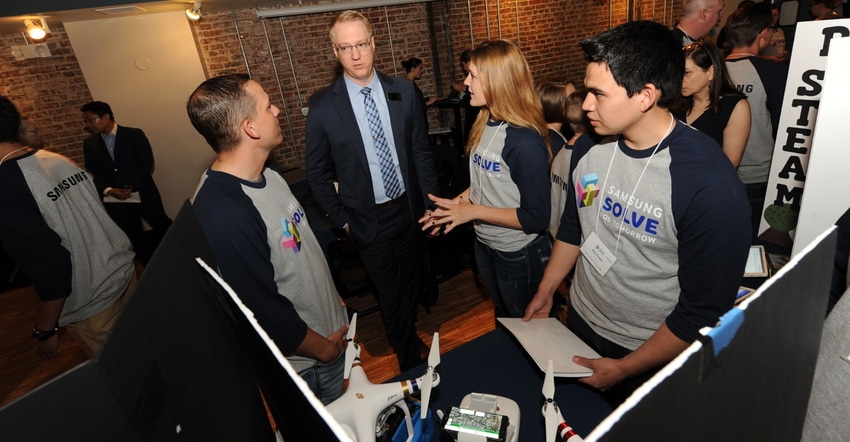May 25, 2017

A team of students from Gering High School was named one of three national winners in the Samsung Solve for Tomorrow Contest in April. Gering received a $150,000 grant and $20,000 for a local nonprofit of their choice, which was the University of Nebraska-Lincoln's Panhandle Research and Extension Center in Scottsbluff.
The contest challenged sixth- through 12-graders to use science, technology, engineering, arts and math to address real-world problems in their communities. With a growing concern for a safe water and food supply, an electronics class at Gering High School and their teacher, Justin Reinmuth, designed and built an UAS-powered spraying system to target weeds and eliminate the need to blanket-spray large fields.
"The project entails two drones," Reinmuth says. "The first drone is a scout drone, which takes aerial photos of a given field to evaluate the crop health and presence of unwanted vegetation. The second drone is the applicator drone, which is implemented to spray only the foreign vegetation instead of blanket-spraying the entire field, thus reducing the amount of chemicals being overused in our community."
According to Reinmuth, the Panhandle Research and Extension Center was a great partner during the project. Gering students had access to the center's land to fly the UAS, and Extension educator Aaron Berger invited the team to a producer meeting in Banner County, featuring a discussion and demonstration of unmanned aircraft system in agriculture.
"We're proud that the youth from western Nebraska recognized the significance of agriculture to our future and used this project to put a spotlight on this issue," says Extension educator Gary Stone, who facilitated the center's involvement with the project
Over 5,300 teams from across the country entered the contest. Gering started the project in October and soon learned it was one of five finalists from Nebraska. The team won first place in the state and was a top 10 finalist in the country. Those 10 teams were invited to Washington, D.C., in April to a special awards ceremony, where the three winners were announced. While there, the team also met with and presented their project to U.S. Rep. Adrian Smith of Nebraska.
Source: IANR News Service
You May Also Like




